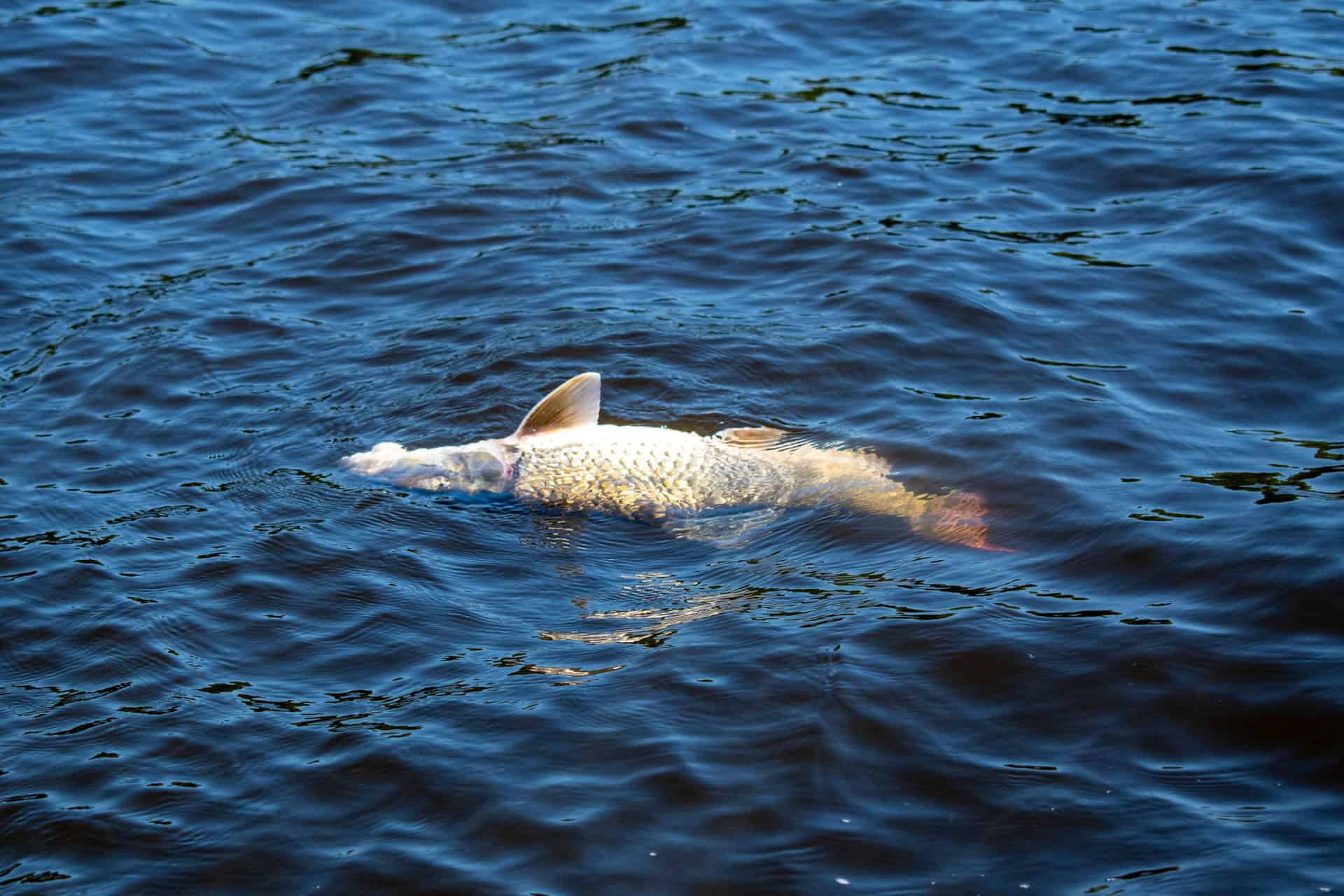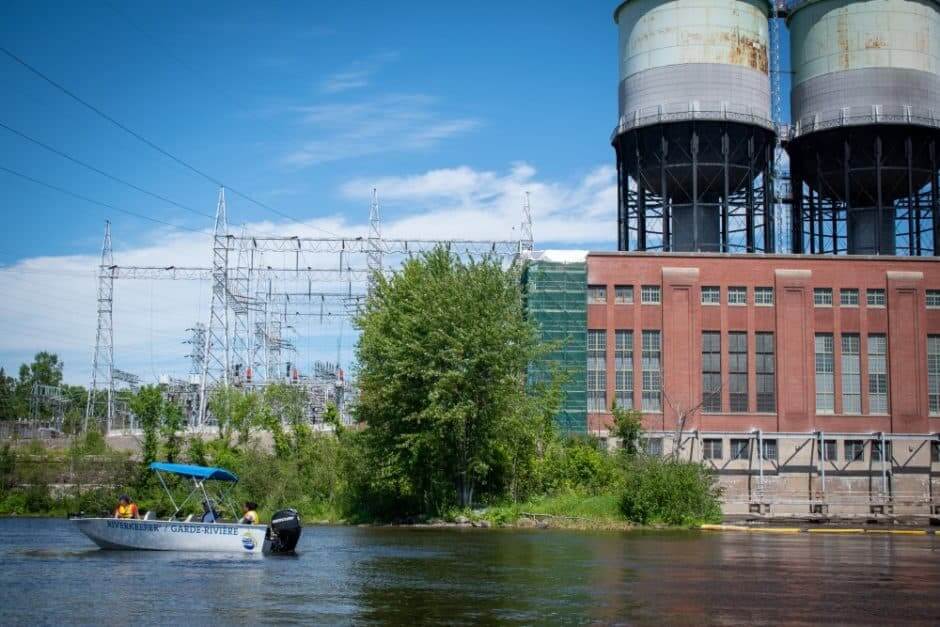Posted: July 8, 2020
Ottawa River Fish kill – One year later

On July 8th, 2019, Ottawa Riverkeeper heard of large numbers of dead fish downstream of the Lièvre River. One year later, we look back at this incident and worry that not much has changed.
On July 8th, 2019 a concerned citizen called Ottawa Riverkeeper’s Pollution Hotline number to report a sighting of a large number of dead fish floating in the Ottawa River near Clarence-Rockland, in an area known as Sand Bar. Ottawa Riverkeeper worked with local volunteers to confirm this report and alerted federal and provincial authorities. In the hours and days that followed, we began to comprehend the scale of this incident, the wide variety of species impacted and that the origin point was somewhere in the Lièvre River.
In the weeks following the first reports, we kept asking federal and provincial agents about what information was available in order to answer the many questions that were being asked by the public. More concerning was that, even as the initial incident was being investigated by authorities, three additional fish kill events occurred over the month of July in this same area.
One year later, we still have many questions about how authorities dealt with these fish kill events, including if and how information was shared to resolve the problem as quickly as possible. It has left us to wonder what would happen if a similar incident were to occur again, and our overwhelming conclusion is that very little would be different.
We see the first year anniversary as an opportunity to ask for federal, provincial and municipal authorities to do better. When major events occur on the Ottawa River, all authorities should work together to resolve the issue as efficiently and effectively as possible. We strongly recommend a joint Federal, Québec, and Ontario body, that would respond to environmental emergencies on the Ottawa River and its tributaries. This would include data-sharing agreements, sharing expertise in analysis and interpretation of results, rapid response, and robust communications both internally among authorities but also with the impacted communities. We have many examples of how this cooperation was not in place during these fish kill events, and how better coordination could have benefited everyone involved. This joint body would still look to federal and provincial authorities to use their respective legislation to hold those responsible to account.
When the fish kill event was first reported, Environment and Climate Change Canada (ECCC), Ontario, and Quebec all visited the area, observed what was happening, and started to collect data. However on July 9th, when the Lievre River – a tributary on the Quebec side of the river – was identified as a source for the dead fish and the location where the event originated, Ontario stopped any data collection or activities that would contribute to finding a solution, even while hundreds of dead fish continued to wash up on the banks of the Ottawa river on the Ontario side.
Both federal agents for ECCC and Quebec’s Ministre des Forêts, de la Faune et des Parcs (MFFP) and ministere de l’Environnement et de la Lutte contre les changements climatiques (MELCC) continued to work on determining the cause of the fish kills throughout the month of July. How well was the information they each obtained shared among those leading these inspections?

On August 1st, Quebec’s Ministère de l’Environnement et de la Lutte contre les changements climatiques stated publicly that they believed the most likely cause of the incidents was the hydro dam and followed with an Order on August 15th and September 25th detailing their findings which announced that, according to their analysis, the power station operator Brookfield was responsible for the summer’s four fish kill incidents on the Lièvre River. Environment and Climate Change Canada has not released their findings.
There was no clear communication in the days following the first kill from any level of government, including whether or not it was safe to access the water or consume fish in this area. One year later and we don’t believe the situation would be any different if a similar event occurred. An inter-governmental body, such as the one we recommend, would be responsible for clear and direct communication in watershed wide crises. With a focus on keeping waterways clean and communities safe, this group would fill a much needed gap in communications that was exposed by the incidents last year.
Fish kill events have been very rare in the Ottawa River. There have not been any more fish kill events in the Lièvre since July 31st, 2019. Ottawa Riverkeeper has been working to access the full picture of what happened if we learn anything new, we will share it.
To review the details of these events, please visit our list of FAQs assembled at the time, which provides a more thorough overview.
Listen to our friend Yannick, a fish guide in the area, listing off different types of dead fish as they float by his boat. This was filmed after the second fish kill event, as he made his way from the Rockland boat launch upstream towards the Lièvre River.

I recall that announcement that this hydro dam operator was to blame. Was this finding not disputed? Anyway, that was last August, almost a year ago.
This communication offers no new information.
A coordinating body was an idea floated in the report following MP McGuinty’s motion. I have seen no follow-up.
All very discouraging.
This just shows on how much the governing bodies that are supposed to protect our surrounding rivers act by discontinuing the full investigation..either be it on the Quebec or Ontario sides and when it was found out it was a dam operator..what happened? Did the dam operator do to get so many fish killed? No answers there.
The mill as been there since 1930. What is new at that exact location is HEXO. A very large producer of cannabis. Cannabis requires a lot of nitrogen fertiliser. When nitro fertiliser gets in to rivers or streams it displaces the oxygen, The fish suffocate, farmers have known this for a long time. The cause of this terrible environment disaster, was an immature liberal decision rushing to legalise pot